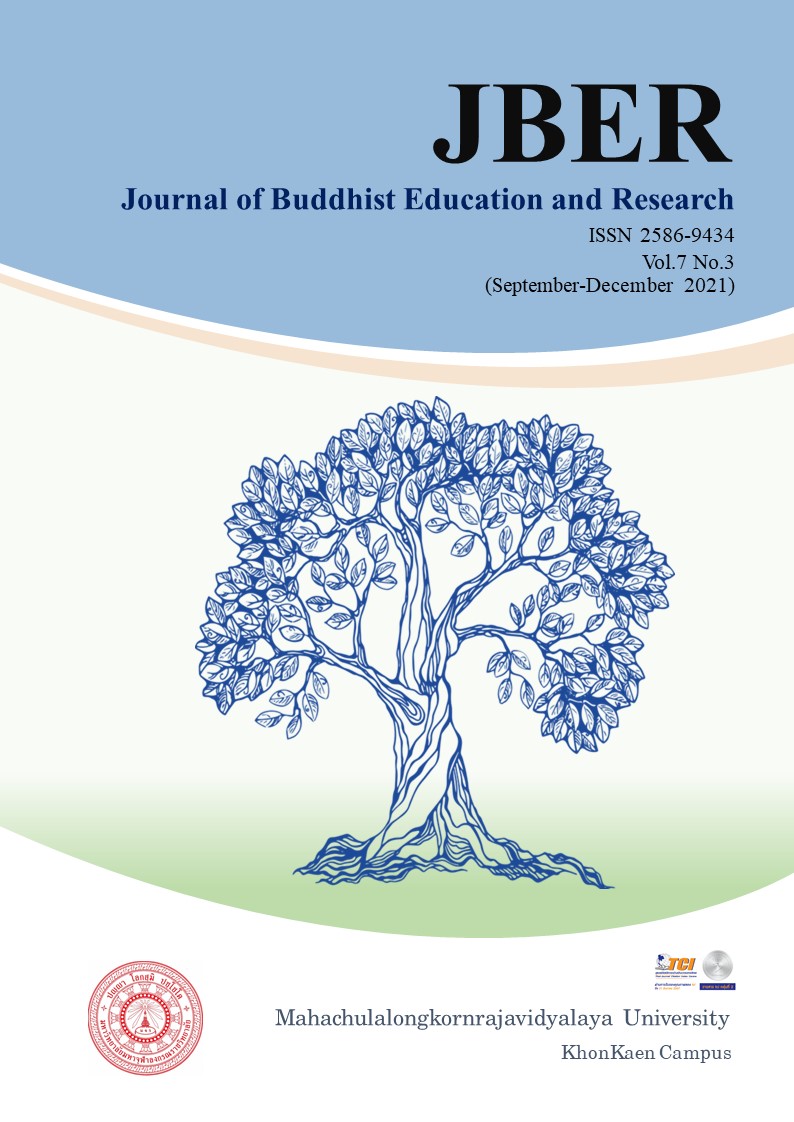ปรัชญาการเมืองในพุทธศาสนาเถรวาทที่มีผลต่อแนวคิดสังคมนิยม ของไกสอน พมวิหาน
คำสำคัญ:
ปรัชญาการเมือง, พุทธศาสนาเถรวาท, สังคมนิยม, ไกสอน พมวิหานบทคัดย่อ
การวิจัยนี้ มีวัตถุประสงค์ 1) เพื่อศึกษาปรัชญาการเมืองในพุทธศาสนาเถรวาท 2) เพื่อศึกษาแนวคิดสังคมนิยมของไกสอน พมวิหาน 3) เพื่อวิเคราะห์ปรัชญาการเมืองในพุทธศาสนาเถรวาทที่มีผลต่อแนวคิดสังคมนิยมของไกสอน พมวิหาน เป็นการวิจัยเชิงคุณภาพ โดยการเก็บข้อมูลจากเอกสารปฐมภูมิและเอกสารทุติยภูมิ วิเคราะห์ข้อมูลด้วยวิธีการพรรณนาตามหลักอุปนัยวิธี
ผลการวิจัยพบว่า
- ปรัชญาการเมืองในพุทธศาสนาเถรวาท คือหลักคำสอนของพระพุทธเจ้าที่ตรัสสอนเกี่ยวกับการเมืองการปกครอง ที่ใช้ในการแก้ไขปัญหาสังคม ในเรื่องสิทธิ เสรีภาพ ความเสมอภาค และภารดรภาพ เพื่อให้คนอยู่ร่วมกันในสังคมด้วยความรัก ความสามัคคี และการช่วยเหลือเกื้อกูลกันในลักษณะเป็นธัมมิกสังคม
- แนวคิดสังคมนิยมของไกสอน พมวิหาน คือแนวคิดทางการเมืองการปกครอง 4 ด้าน 1) ด้านปรัชญาการทำงาน 2) ด้านการปกครอง 3) ด้านความเสมอภาค และ 4) ด้านภราดรภาพ ที่ใช้ในการเมืองการปกครองสาธารณรัฐประชาธิปไตยประชาชนลาวให้เจริญก้าวหน้า และเพื่อให้เกิดความสงบสุข ความยุติธรรม ความเสมอภาค ความมีภราดรภาพภายในประเทศ
- ปรัชญาการเมืองในพุทธศาสนาเถรวาทที่มีผลต่อแนวคิดสังคมนิยมของไกสอน พมวิหาน มี 4 ด้าน 1) ด้านการทำงานเพื่อประโยชน์ส่วนรวมโดยยึดหลักความเสียสละ และประโยชน์สุขของประชาชนเป็นสำคัญ 2) ด้านการปกครอง เป็นการทำหน้าที่รักษาสิทธิ และความยุติธรรม 3) ด้านความเสมอภาค เป็นการทำหน้าที่ดูแลสิทธิของประชาชนแต่ละเผ่าและเพศอย่างเท่าเทียมกัน และ 4) ด้านภราดรภาพ เป็นการสร้างหลักการอยู่ร่วมกันแบบพี่น้องด้วยการเคารพศักดิ์ศรี และคุณค่าความเป็นมนุษย์
เอกสารอ้างอิง
ดาณุภา ไชยพรธรรม. (2537). การเมืองการปกครองเรื่องที่ทุกคนต้องรู้. กรุงเทพฯ: แพรธรรมสำนักพิมพ์,
ไผท ภูธา (แปล). (2556). ความเป็นมาของชนชาติลาว การตั้งถิ่นฐานและสถาปนาอาณาจักร เล่ม 1. กรุงเทพฯ: สุขภาพใจ.
พันธ์ทิพย์ ธีระเนตร/สมชาย นิลอาธิ (แปล). (2555). ประวัติศาสตร์เมืองพวน. กรุงเทพฯ: เรือนแก้วการพิมพ์.
มหาศีลา วีระวงส์. (2500). พงสาวะดานลาว. นครหลวงเวียงจันทน์: กระทรวงศึกษาธิการ. สปป.ลาว.
พระวอนชัย จิตฺตวโร. (2562). ปรัชญาสังคมนิยมของท่านไกสอน พมวิหานในช่วงปี ค.ศ. 1975-1990. วารสารบัณฑิตศึกษามหาจุฬาขอนแก่น, 6(4): 904-919.
ดาณุภา ไชยพรธรรม. (2537). การเมืองการปกครองเรื่องที่ทุกคนต้องรู้. กรุงเทพฯ: แพรธรรมสำนักพิมพ์,
ไผท ภูธา (แปล). (2556). ความเป็นมาของชนชาติลาว การตั้งถิ่นฐานและสถาปนาอาณาจักร เล่ม 1. กรุงเทพฯ: สุขภาพใจ.
พระวอนชัย จิตฺตวโร. (2562). ปรัชญาสังคมนิยมของท่านไกสอน พมวิหานในช่วงปี ค.ศ. 1975-1990. วารสารบัณฑิตศึกษามหาจุฬาขอนแก่น, 6(4): 904-919.
พันธ์ทิพย์ ธีระเนตร/สมชาย นิลอาธิ (แปล). (2555). ประวัติศาสตร์เมืองพวน. กรุงเทพฯ: เรือนแก้วการพิมพ์.
มหาศีลา วีระวงส์. (2500). พงสาวะดานลาว. นครหลวงเวียงจันทน์: กระทรวงศึกษาธิการ. สปป.ลาว.
สมสี จันตะพม (2014). บทบาทแนวคิดการเมืองของปะทานไกสอน พมวิหานต่อการคุ้มครองรัฐ-คุ้มครองสังคมอยู่ สปป.ลาว. วิทยานิพนธ์มหาบัณฑิต สาขาวิชาการเมืองวิทยา. สถาบันการเมืองและการปกครองแห่งชาติ. สปป.ลาว.
สุธิดา ตันเลิศ. (2541). ไกสอน พมวิหาน กับพัฒนาการสังคมนิยมลาว ระหว่าง ค.ศ. 1975-1986. วิทยานิพนธ์ อักษรศาสตรมหาบัณฑิต สาขาวิชาประวัติศาสตร์เอเชียตะวันออกเฉียงใต้. บัณฑิตวิทยาลัย มหาวิทยาลัยศิลปากร.





